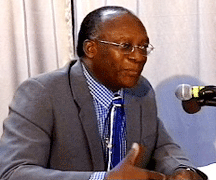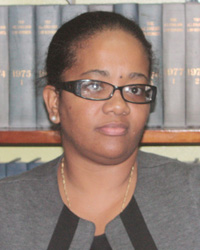
Prosecutors acted within the law when they brought nine charges against opposition senator, Vynnette Frederick, on July 11, former attorney general, Parnell R. Campbell, QC, says.
Speaking on his weekly television programme on Monday, Campbell addressed some of the legal issues surrounding the development.
Nine charges relating to false declarations, swearing falsely, and fabricating evidence were brought against Frederick, hours after a magistrate threw out six perjury charges against her.
“The prosecution can lawfully bring amended charges or fresh charges against Miss Frederick, notwithstanding that the original charges were thrown out because they did not have sufficient particulars,” Campbell explained.
He said the law requires that a person charged with an offence must, from the nature of the charge, understand what they are charged with.
He further said that because of the nature of perjury or making false statements, it is essential for the charges to specify the precise words that the person used which are alleged to have constituted the offence.
“So where an offence is charged and sufficient particulars are not given on the charge sheet, it is open to the defendant to say I do not understand this charge, I cannot plea to it, as Miss Frederick did when the charge was originally put to her.”
The six original charges stem from the contents of affidavits that Frederick filed as part of a private criminal complaint against Prime Minister Dr. Ralph Gonsalves following the December 2010 general elections.
During one of her initial court appearances, Frederick, a lawyer, told the magistrate that she did not know how to plea, since she did not understand the charges against her.
Magistrate Rickie Burnett gave the prosecution an opportunity to supply the missing particulars.
Frederick’s lawyers in April made a submission to the court that the charges were not properly made out and the magistrate upheld that submission, and threw out the charges on July 11.

Campbell said the magistrate was totally within his power to make the decision that he did.
In making his decision, the magistrate doesn’t have to consider what people will think, he further noted and congratulated the magistrate on the ruling.
“Congratulations to Mr. Burnett on ruling with courage … He must have known full well some people would be happy with the ruling, some people would not be happy but it is not his business to care who would be happy and who would not be happy.
“His business was to rule in accordance with his legal knowledge. That he did; congratulations to Magistrate Burnett,” Campbell said.
He further explained that to throw out cases for lack of particulars do not amount to acquittals.
“So, it was not an acquittal. It was not a verdict of not guilty. It was simply an acknowledgement that these charges didn’t come up to scratch. They didn’t meet the required standard which must be met before a citizen could be put to face an allegation that he or she has broken the law,” Campbell said.
He, however, noted a difference between legality and morality.
“But the fact that it is lawful to do something doesn’t mean it is morally right to do it. That’s a difference. And the manner in which it was done invites criticism of the strongest kind,” he said.
Campbell told viewers that his comments should not be interpreted as a statement on Frederick’s innocence or guilt of the charges against her.
He further said his comments were based solely on media reports on the case, adding that he has not discussed it with any of the persons involved.





